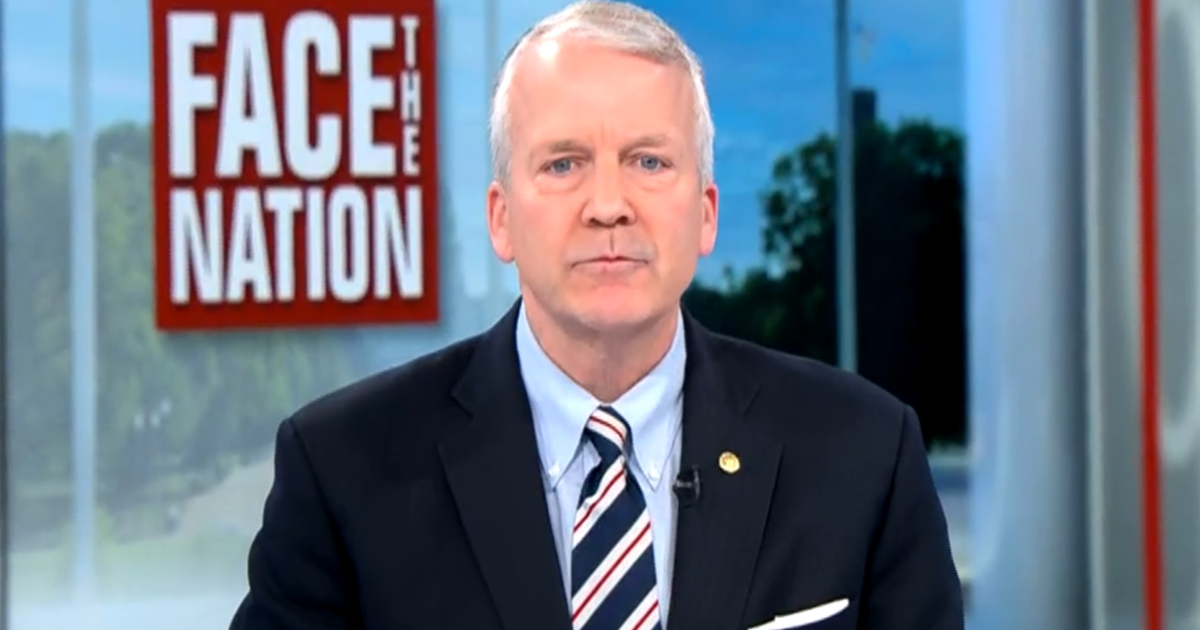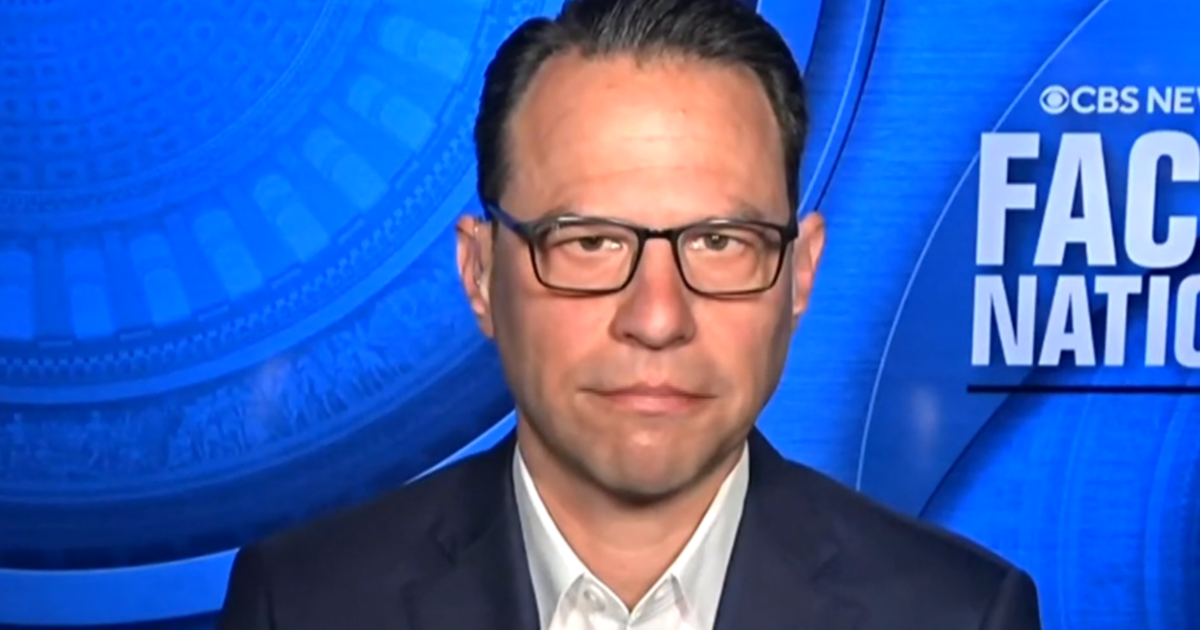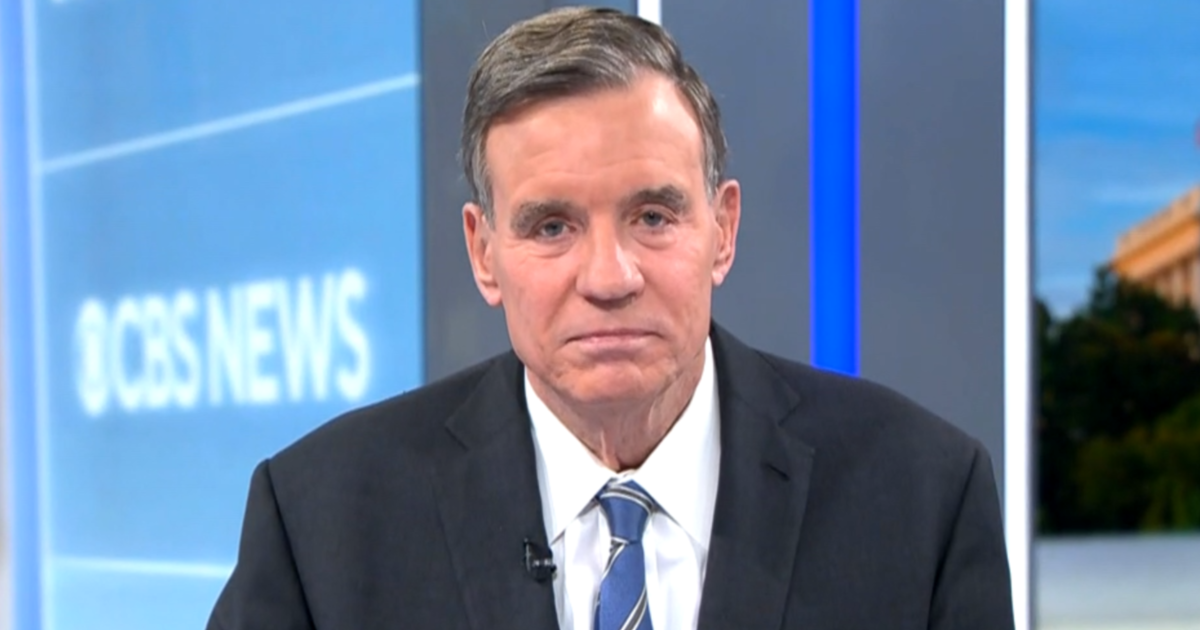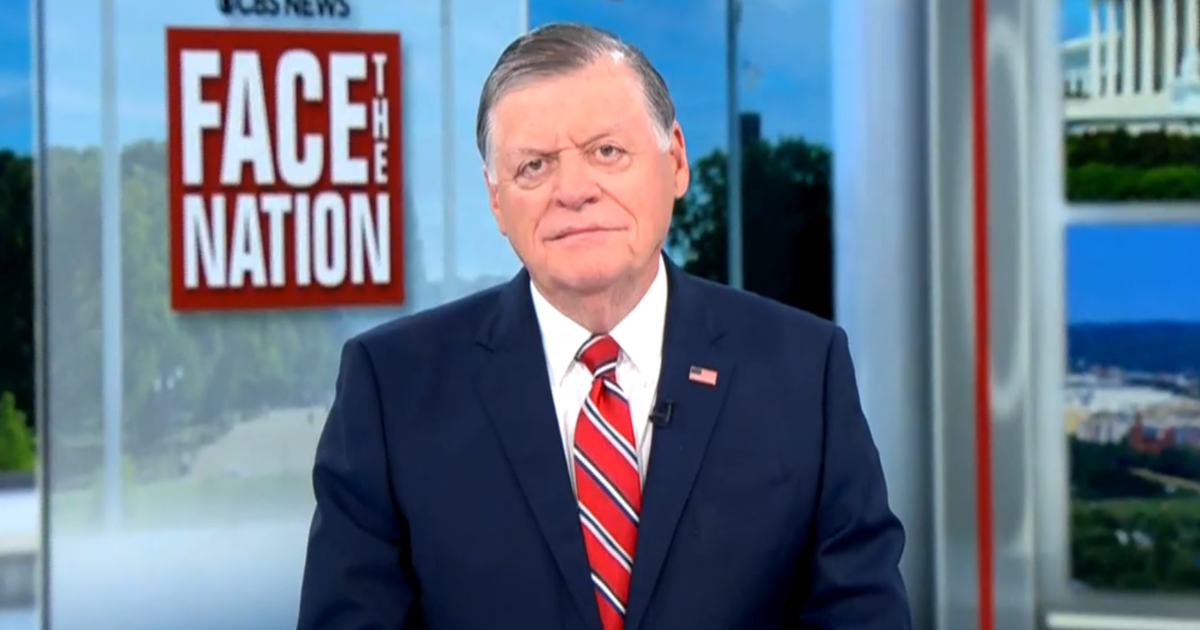Transcript: Former Secretary of State John Kerry on "Face the Nation," September 22, 2019
The following is a transcript of the interview with former Secretary of State John Kerry that aired Sunday, September 22, 2019, on "Face the Nation."
MARGARET BRENNAN: We're back now with former Secretary of State John Kerry. He's in town as part of a U.N. push to combat climate change. Mr. Secretary, good to see you here. Great to have you here.
FORMER SECRETARY OF STATE JOHN KERRY: Great to be here. Happy to be with you. Thank you.
MARGARET BRENNAN: We want to talk to you about this climate project but I want to start on Iran.
KERRY: Sure.
MARGARET BRENNAN: The United States is not required to defend Saudi Arabia in the wake of this attack, but does the U.S. look weak if it doesn't militarily respond?
KERRY: Not if we do other things that show strength and confidence in a genuine strategy and policy, and that's what's really lacking here I think. You've got to- you've got to go back to the beginning here. We had an agreement. We have an agreement, that the rest of the world supports--
MARGARET BRENNAN: The nuclear deal.
KERRY: --the nuclear agreement. And I heard Secretary Pompeo say well we want to get into a place where we know they can't have a nuclear weapon. Well we're there. We were there. And France, Germany, Britain, China, Russia, all still support a multilateral agreement that was a model of multilateral diplomacy. We came together, the world welcomed this, the United Nations security council ratified it, embraced it. And that still is there. Along comes President Trump and he pulls out. He broke the agreement.
MARGARET BRENNAN: You think pulling out--
KERRY: He is the one well- what--
MARGARET BRENNAN: --caused this escalation?
KERRY: The escalation is the absolutely foreseeable and it was foreseen that this is what would happen. Why do I say that? Because we were ridiculed for saying that the alternative to what we were trying to do in making the agreement was war, was conflict. I mean I- I personally had leaders in the Middle East telling me you've got to bomb Iran. We had a prime minister of Israel come to America and ask for a green light to bomb. So, we were averting war. And when we signed the agreement in- in Vienna, the initial agreement, we all agreed that this was a way to avoid a war and open up a channel of communicating, and diplomacy to be able to deal with legitimate other issues that are concerned with Iran. We're concerned about their support for Hezbollah. We're concerned about their missiles. We're concerned about Yemen. We're concerned about interference in other countries. But what is the best way to deal with that, Margaret? That's the question--
MARGARET BRENNAN: But can the nuclear deal be salvaged now--
KERRY: --and by breaking this--
MARGARET BRENNAN: given that Iran is already starting—
KERRY: Of course, of course it could be salvaged.
MARGARET BRENNAN: --to push the limits and cheat here?
KERRY: Well, they- I think-
MARGARET BRENNAN: And there are sunset clauses.
KERRY: Yes they are. Look, I think and- and you've got to be really clear and honest about what's happening here. I believe Iran, one way or the other, was behind the attack that took place. That to me is obvious. And it's also obvious that it's got to be denied. And it will be denied right now because they need the plausible deniability. But the president I think is absolutely is actually correct to be evaluating sort of not being rushed into a corner to go to war. That is what we shouldn't do. But you've also got to look at what happened afterwards, after we pulled out. We basically declared economic war—
MARGARET BRENNAN: Right.
KERRY: --on Iran. We have been pressuring them. Maximum pressure. And it was entirely foreseeable that that would result in further conflict. So we're seeing the unfolding of really a bankruptcy of approach.
MARGARET BRENNAN: Okay.
KERRY: The international community can come together now. I think there is a way to avert war --
MARGARET BRENNAN: And that's going to be one of the pushes this week--
KERRY: --without showing weakness.
MARGARET BRENNAN: I want to take a quick break
KERRY: Sure.
MARGARET BRENNAN: And have a more extended conversation on the other side of it. Don't go anywhere.
KERRY: Great.
MARGARET BRENNAN:Secretary Kerry. All of you stay with us, and a conversation about climate change ahead.
MARGARET BRENNAN: Welcome back to FACE THE NATION. We continue our conversation with former Secretary of State John Kerry. Mr. Secretary at the bit of our conversation where we left off you said you do see a diplomatic off ramp here--
KERRY: Absolutely.
MARGARET BRENNAN: --away from conflict.
KERRY: Our allies still support the agreement but our allies--
MARGARET BRENNAN: The nuclear deal.
KERRY: --the nuclear agreement, but they also support holding around accountable for other issues in the region. I believe better diplomacy, more diplomacy with our allies, bringing people together there is a road to an agreement that could provide a full new security arrangement for the region and deal with the nuclear issue.
MARGARET BRENNAN: Now you famously negotiate- negotiated the Paris climate change accord. I remember you going to the signing with your granddaughter on your knee.
KERRY: Yes- yes, right.
MARGARET BRENNAN: You felt really passionate about this. But even you say that was not sufficient
KERRY: Correct.
MARGARET BRENNAN: Every Democrat running says they're going to rejoin this accord.
KERRY: Yes. Not adequate.
MARGARET BRENNAN: It's not adequate.
KERRY: No.
MARGARET BRENNAN: What more needs to be done?
KERRY: An enormous amount. We have to transition very rapidly to electric vehicles, we have to get to a net zero carbon economy in our country by 2050, we have to by 2030 have moved significantly in the direction of major changes. Every scientist who has been involved in this for years is telling us we have a certain number of years in order to be able to respond, and no nation in the world is responding adequately. So, we're going to create a movement here in America, I believe, that will and across the world actually- a global movement called World War Zero. And you can go to WorldWarZero.com now and there's an introductory page, in October we'll be filling out the full web site. But we will be announcing this in full with big names, a big concept that is going to help change the political dynamic in America, it's going to create political accountability around the world for leaders who are not doing what is necessary.
MARGARET BRENNAN: Well about 60 countries at the U.N. this week are expected to make some kind of pledge to reduce—
KERRY: Some kind is a good word.
MARGARET BRENNAN: --some kind of pollution. If the United States, the Trump administration, and China aren't leading this, is it meaningless?
KERRY: Well, it's not meaningless.
MARGARET BRENNAN: They're the two biggest polluters.
KERRY: No, it's not meaningless.There are countries: India, China are going to make announcements. And it's steps forward. But the United States of America represents the second largest amount individually of emissions that contribute to this. China is 25 percent. We're 15 percent. We have to be at the table. We have to be involved. And- and this is a life and death issue, as kids I mean 16-year-old kids and a lot of children all around the world are saying, "save the future for us." They can't vote in the Congress. They don't have a position in the boardroom right now. So more and more companies are actually coming to the table. We're working with a- a group called We Mean Business, a thousand companies, twenty one trillion dollars of assets. They're committed to moving, and I believe we can change the dynamic and hold politicians accountable. That's the key. We did it in 1970 with Earth Day. We created the EPA. We created the Clean Air Act. Many other things. We have to create political accountability and make this an issue that will motivate people.
MARGARET BRENNAN: So, on that point, is there a Kerry standard when it comes to endorsing one of the candidates running for president? Are- are- is this an issue you want to see specific policies on before you endorse--
KERRY: I think this has to be--
MARGARET BRENNAN: Any Democrats?
KERRY: It has to be one of the top voting issues in our nation and in the world. And it has to be one of the top organizational issues. That's why it's called World War Zero because the world has to be involved, because the deniers and the- the- the distorters and the delayers have literally declared war on people. We're- they're dying. Today, we have people dying in mudslides, dying in fires, dying in- in- in floods. Farmers are losing their livelihood. Amazing things are happening. And the response is not adequate. So, we have to make this an issue which goes to the ballot box, which Americans and people all around the world are saying we have to change our direction. It can be done in a way that creates millions of jobs. This is not. People are really irresponsibly scaring people, lying to people. Telling them you're going to lose your job, you're going to lose your way of life. No, you're actually going to have a healthier life. They're going to be more jobs, better paying jobs. This is a revolution that I think young people are way ahead of the leaders on this. And we have to make sure we are accountable to ourselves and to future generations.
MARGARET BRENNAN: You obviously served alongside Joe Biden in the Obama administration, the secretary of state seemed to be supporting, on this program, what Rudy Giuliani, the president's personal attorney, is doing in terms of calling for an investigation into Joe Biden.
KERRY: Well first of all, it is entirely--
MARGARET BRENNAN: What do you think of this?
KERRY: --inappropriate for the president's personal attorney to be involved in another country trying to find dirt on a presidential candidate, number one. Number two, what President Trump has done is an abuse, if he has done it, and the way to prove whether he's done or not is release the transcript of that conversation. That's how you get to the bottom of this, but there's just, you know, for the president of the United States to be leveraging American foreign policy, hocking it, extorting the leader of another country, if that's what has happened, is unprecedented. And the last time a president did that, Richard Nixon, the Republican Party stood up and held him accountable for the abuse of power. This Republican Party today is- is running for cover and actually inadvertently supporting a cover up. If- if- if what is alleged is true. The only way to get at it is release the transcript. Let everybody see what the president said and if he leveraged American foreign policy and foreign aid to- to get a president of another country to be the opposition research--
MARGARET BRENNAN: Right.
KERRY: --arm of his campaign, that is a fundamental profound and deeply disturbing--
MARGARET BRENNAN: Do you know what--
JOHN KERRY: --abuse of power.
MARGARET BRENNAN: Do you know what Secretary Pompeo was talking about when he said election interference?
JOHN KERRY: I- I don't, I have--
MARGARET BRENNAN: I mean were you surprised he talked about that?
JOHN KERRY: --no idea. No, I don't. I don't know what that is-
MARGARET BRENNAN: Is it an appropriate thing for the secretary of state to be talking about?
JOHN KERRY: I have no idea what he was talking about. So I'm not going- I'm not going to make a judgment on that.
MARGARET BRENNAN: You, before you were secretary of state you spent decades--
JOHN KERRY: I mean maybe he's referring to the Russian pieces. I mean I don't know.
MARGARET BRENNAN: I asked him about Ukraine. So, he seemed to be linking it when he said election interference and Joe Biden.
JOHN KERRY: Yes, but can I say one other thing?
MARGARET BRENNAN: Yes.
JOHN KERRY: The- the Obama administration, as a whole administration, was working overtime to try to end corruption in Ukraine. You couldn't move forward to deal with Ukraine if it didn't end corruption. So, that was the focus. It was professionals in the State Department and- and an ambassador who requested that we be involved to try to get a prosecutor out of the way who was not able to move. That was an administration policy, it was the professional diplomats who requested that we try to do that. So, I think there's no equivalency here. The president's just as, you know, throwing up a distraction. The fact is that that transcript needs to be released in order to clarify whether or not this president has again colluded in a way with another country that is inappropriate.
MARGARET BRENNAN: Can I ask you very quickly about the seat that you held in Congress?
KERRY: Well, you can ask, but I'm not, I'm not --
MARGARET BRENNAN: The Senate, you don't want to pick someone in the primary race --
KERRY: No, I'm just --
MARGARET BRENNAN: --for your old seat in the Senate in Massachusetts. But are you surprised to see this, does this demonstrate to you in any way the divide between you know, Joe Kennedy, grandson and- and scion of that family as sort of the more progressive arm of the Democratic Party versus someone, Ed Markey, who you know well?
KERRY: Margaret, I am not going to comment on what's happening there and I'm not going to comment on 2020 at this point in time. There's a time when it may be appropriate and I'll- I'll weigh in, but not today.
MARGARET BRENNAN: Hopefully it'll be with us here on Face the Nation, when you do, Mr. Secretary, always good to talk to you.
KERRY: Thank you.
MARGARET BRENNAN: We'll be right back with our panel. Stay with us.



